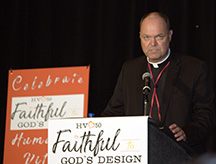A month or so ago, I was checking bags at the airport when the airline attendant said to me: “Father, I know it’s been a tough year for you all!” Her comment caught me by surprise for a couple of reasons. For one, it has been my experience (albeit limited to my present assignment as pastor of a medium-sized parish) that my English and Spanish speaking parishioners do not often bring up the clergy abuse crisis. They are certainly aware of it as the topic comes up from time to time in homilies and in other ways. For example, we pray for purification of the Church and healing for victims in the daily and Sunday Mass “General Intercessions” and during our weekly “Holy Hour and Rosary for Reparation”. Even though it is a topic that surely is of concern to them, it is not one my parishioners often raise.
The second reason the airline attendant’s comment struck me was that she was able to say something about clergy abuse in the first place. I had no idea if the attendant was Christian or Catholic, but the fact that she could bring it up to me seemed to me a good thing. We cannot confront the clergy abuse crisis if we stay silent about it. Clearly, the silent approach has not worked. God willing, in talking about, on the one hand, the spiritual, psychological and emotional destruction that clergy abuse causes and, on the other hand, how to bring about healing and prevention, we will be able to move forward in a positive way.
When I heard, “it’s been a tough year,” I could not help thinking to myself that it’s been a tough hundred years. Yes, this last summer marked the fiftieth anniversary of Humanae Vitae, the Encyclical by Pope Paul VI which reaffirmed the Catholic Church’s teaching on the sacred gift of marital love and the transmission of life. But Humanae Vitae’s roots go back to Casti Connubii, the 1930 Encyclical of Pope Pius XI, which was written, in part, to respond to the Lambeth Conference earlier that same year. The Lambeth Conference opened the way for approving the use of contraception in some cases in the Anglican Communion. Soon, other denominations would follow the example of the Anglican Church. Nonetheless, to put the present crisis into the perspective of the last hundred years does not diminish its seriousness. It is very serious and it demands serious attention and conversion, not to mention penance and prayer.
Where do we go from here? I think part of the answer to this question lies in something I find myself saying to penitents (and to myself): “Identify what you have control over and begin with that.” I might be inclined to think that the clergy abuse crisis has nothing to do with me. But, of course, it does. Every time I am tempted to drift towards an uncharitable, unchaste or slothful action, I need to have the presence of mind to call it out, and, with God’s grace, overcome it. “There but for the grace of God go I.” Abusers, clergy or otherwise, allow one bad decision to pile onto another, until things snowball and they lose touch with the horrible sins they have committed. They compartmentalize so as not to have to face the evil they have done. Abuser priests tend to isolate themselves from their brother priests. This tells me that I need to do a better job of staying in touch with my brother priests, praying with them and spending time with them.
As a spiritual father, I need to stay in contact with my bride, the Church, which in my case is my parishioners. I stay in touch with my parishioners by celebrating daily Mass and making myself available to their sacramental and pastoral needs. As a friend of Jesus Christ, I need to spend time with my Lord every day through my daily holy hour and the praying of the Liturgy of the Hours.In order to be a happy, healthy and holy priest, I need take care of the body that God has given me and to pursue interests that I can enjoy and engage in for the greater honor and glory of God. Finally, it is vitally important that I foster good friendships and relationships with friends and family. Among the reasons that I enjoy serving on the CANFP Board is the gift of being able to work with others who believe in the truth and beauty of living out God’s plan for fruitfulness in the married and consecrated states, naturally, faithfully and morally. I feel blessed to be able to serve as President of CANFP and walk with you during this new year of grace!

Fr. Blaise Berg, STL, STD, has served on the Executive Board of CANFP since 2003, currently as President.
His academic formation included studying in the “great books program of the St. Ignatius Institute at USF, an MBA from Cal Poly in San Luis Obispo, a baccalaureate degree in theology (S.T.B.) from the Gregorian University in Rome, seminarian studies at the North American College in Rome, and earning a licentiate (S.T.L) as well as a doctoral degree in theology (S.T.D.) at the John Paul II Institute for Studies on Marriage and the Family at the Lateran University, in Rome, where he also was ordained to the priesthood, for the Diocese of Sacramento.
Prior to his current assignment as pastor of St. Mary’s Parish in Vacaville, he also served at St. Rose and St. John the Baptist parishes, as chaplain of St. Thomas Aquinas Newman Center in Chico, as well as Vice-Chancellor and Secretary to Bishop Weigand, and more recently as Episcopal Vicar for Clergy.
